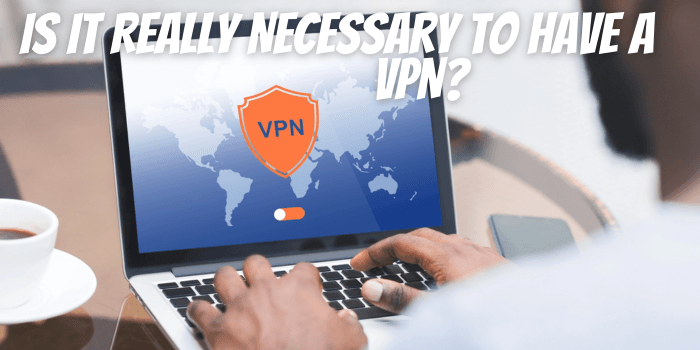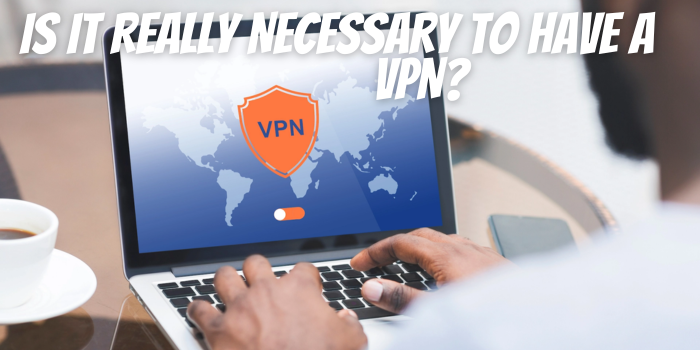
Is It Really Necessary to Have a Vpn
Is It Really Necessary To Have A VPN?
Online privacy and security have become a significant concern for many internet users in today's increasingly digital world. As a result, many people have turned to virtual private networks (VPNs) as a way to protect their online activities from prying eyes.
However, some may wonder if it is really necessary to have a VPN, especially if they don't engage in activities that require high levels of online security.
This article, which includes the best features of PewDiePie NordVPN, seeks to answer the issue of whether

a VPN service is required. We'll go over the pros and cons of utilizing a VPN.
You will have a better knowledge of the benefits and drawbacks of utilizing a VPN service, particularly one like PewDiePie NordVPN, by the conclusion of this post.
What Are The Benefits Of Using A VPN?
Using a VPN can provide several benefits, including:
Enhanced online security: By encrypting your internet traffic, a VPN can help protect your online activities from hackers, cybercriminals, and other unauthorized third parties.
Protection on public Wi-Fi: Public Wi-Fi networks are often insecure, making it easy for others to intercept your data. A VPN can help secure your connection and prevent others from accessing your information.
Access to geo-restricted content: With a VPN, you can bypass geo-restrictions and access content that may be blocked in your region.
Anonymous Browsing: A VPN can help protect your online anonymity by masking your IP address and preventing others from tracking your online activities.
Privacy protection: By hiding your online activities from your ISP and other third parties, a VPN can help protect your privacy online.
In short, while it may not be necessary to have a VPN for all internet users, the benefits of using one, such as enhanced security and privacy protection, make it a valuable tool for anyone who values online security and privacy.
Do I Need A VPN For Everyday Browsing?
Whether or not you need a necessary VPN service for everyday browsing depends on your individual needs and preferences. Here are some factors to consider:
Your online activities: If you frequently engage in activities that involve sensitive information, such as online banking or shopping, then a VPN may be necessary to protect your data.
Your Internet service provider (ISP): Some ISPs may collect and sell user data, which can compromise your online privacy. In such cases, a VPN can help protect your privacy by encrypting your internet traffic.
Public Wi-Fi: If you frequently use public Wi-Fi networks, such as those found in coffee shops or airports, then a VPN is highly recommended to protect your data from potential hackers.
Geo-restricted content: If you want to access content that is not available in your region, then a VPN can help bypass these restrictions.
Therefore, while it may not be necessary to have a VPN for everyday browsing, the potential benefits, such as enhanced security and privacy protection, make it a valuable tool for anyone who values online security and privacy.
It is important to assess your individual needs and preferences when deciding whether or not a VPN is necessary for your everyday browsing.
How Does A VPN Protect My Online Privacy And Security?
A VPN (Virtual Private Network) protects your online privacy and security in several ways, including:
Encryption: When you connect to a VPN, your internet traffic is encrypted, which means that your data is scrambled and protected from potential hackers or cybercriminals.
Anonymous browsing: A VPN hides your IP address and other identifying information, making it difficult for websites and other third parties to track your online activities.
Protection on public Wi-Fi: A VPN can protect your data on public Wi-Fi networks by encrypting your traffic and preventing others from intercepting your information.
Protection from ISP tracking: Some ISPs may track and sell user data, but with a VPN, your internet traffic is encrypted and hidden from your ISP.
Bypassing geo-restrictions: A VPN can help you bypass geo-restrictions and access content that may be blocked in your region.
Furthermore, it is necessary to have a VPN if you value your online privacy and security. By encrypting your internet traffic and hiding your IP address, a VPN can protect your data from potential hackers, cybercriminals, and other unauthorized third parties. A VPN can also help you avoid geo-restrictions and access material that is restricted in your location.
Can My ISP See My Internet Activity Without A VPN?
Yes, your ISP (Internet Service Provider) can see your internet activity if you don't use a VPN. This is because your internet traffic goes through your ISP's servers before it reaches the websites or services you're accessing.
Without a VPN, your ISP can potentially see which websites you visit, how long you spend on each site, and even what you download or upload. They may also collect this data and use it for advertising or other purposes.
However, when you use a necessary VPN service, your internet traffic is encrypted and routed through a private server, which means your ISP can't see your online activity.
This makes it necessary to have a VPN if you want to keep your internet activity private and secure from your ISP or any other third party that may be monitoring your online activities.
Are Public Wi-Fi Networks Safe Without A VPN?
Public Wi-Fi networks can be unsafe without a VPN, which makes it necessary to have a VPN if you want to protect your online privacy and security.
When you connect to a public Wi-Fi network, your device is often exposed to potential threats, including hackers and cybercriminals who may try to intercept your internet traffic and steal your personal information. This can include login credentials, credit card numbers, and other sensitive data.
However, when you use a VPN, your internet traffic is encrypted, which means that even if a hacker or cybercriminal intercepts your data, they won't be able to read it. A VPN also hides your IP address, making it more difficult for potential attackers to target your device.
Can I Access Geo-Restricted Content Without A VPN?
No, you cannot access geo-restricted content without a VPN, which makes it necessary to have a VPN if you want to access this content.
Geo-restricted content is typically limited to specific geographic locations due to licensing and copyright restrictions. However, when you use a VPN, you can connect to a server in a different country and appear as if you're located in that country, allowing you to access geo-restricted content.
Without a VPN, you won't be able to bypass these restrictions and access the content.
How Do I Choose The Right VPN For My Needs?
It is necessary to have a VPN, but choosing the right VPN for your needs is important. To do this, consider factors such as the VPN's security features, logging policy, server locations, and speed. You may also want to read reviews and compare prices to find the best VPN for your specific needs.
Do I Need A VPN For Streaming Services Like Netflix Or Hulu?
While it's not necessary to have a VPN to use streaming services like Netflix or Hulu, a VPN can be useful for accessing geo-restricted content on these platforms.
By connecting to a server in a different country, you can potentially access more content that may not be available in your region. However, using a VPN for streaming may also impact your connection speed and overall streaming experience.
Appreciate the creator